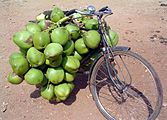
Bicycle poverty reduction is the concept that access to bicycles and the transportation infrastructure to support them can dramatically reduce poverty. This has been demonstrated in various pilot projects in South Asia and Africa. Experiments done in Africa (Uganda and Tanzania) and Sri Lanka on hundreds of households have shown that a bicycle can increase the income of a poor family by as much as 35%.
Transport, if analyzed for the cost–benefit analysis for rural poverty alleviation, has given one of the best returns in this regard. For example, road investments in India were a staggering 3–10 times more effective than almost all other investments and subsidies in rural economy in the decade of the 1990s. A road can ease transport on a macro level, while bicycle access supports it at the micro level. In that sense, the bicycle can be one of the most effective means to eradicate poverty in poor nations.
Gallery
-
 Men in Uganda using a bicycle to transport bananas
Men in Uganda using a bicycle to transport bananas
-
 A man uses a bicycle to carry goods in Ouagadougou, Burkina Faso
A man uses a bicycle to carry goods in Ouagadougou, Burkina Faso
-
 A man hauling coconuts fiber doormats in Indonesia
A man hauling coconuts fiber doormats in Indonesia
-
A man hauling material with a bicycle in Vietnam
-
 A bicycle in India hauling coconuts
A bicycle in India hauling coconuts
-
 A man hauling scrap by bicycle in China
A man hauling scrap by bicycle in China
-
 A man delivering water by bicycle in Nanjing, China
A man delivering water by bicycle in Nanjing, China
-
 Farmers hauling corn stalks by bicycle in southeast Asia
Farmers hauling corn stalks by bicycle in southeast Asia
-
Bicycle Boda Boda in Uganda
-
Hauling firewood by bicycle in Moshi, Tanzania
-
 Distributing bread by bicycle near Lake Tanganyika in the Democratic Republic of the Congo
Distributing bread by bicycle near Lake Tanganyika in the Democratic Republic of the Congo
-
Cracker vender bicycle (sepeda karak) in North Jakarta, Indonesia
-
 Sewing machine bicycle (sepeda penjahit) in Jakarta, Indonesia
Sewing machine bicycle (sepeda penjahit) in Jakarta, Indonesia
-
Water transportation by bicycle in Jakarta, Indonesia
-
 Girls going to school by bicycle in Saigon, Vietnam
Girls going to school by bicycle in Saigon, Vietnam
-
Children returning home from school by bicycle in Xiazhai, China
-
 A man transporting bananas by chukudu in North Kivu
A man transporting bananas by chukudu in North Kivu
See also
- Accessibility (transport)
- Baisikeli Ugunduzi
- Bikes Not Bombs
- Bikes to Rwanda
- BikeTown Africa
- Chukudu
- Pedaling to Freedom
- Transport divide
- With My Own Two Wheels
- World Bicycle Relief
References
- Annie Lowrey (April 30, 2013). "Is It Crazy to Think We Can Eradicate Poverty?". The New York Times. Retrieved August 6, 2013.
- Nicholas D. Kristof (April 12, 2010). "A Bike for Abel". The New York Times. Retrieved August 6, 2013.
- Fred P. Hochberg (January 5, 2002). "Practical Help for Afghans". The New York Times. Retrieved August 6, 2013.
- "Our Impact". Bicycles Against Poverty. Archived from the original on August 27, 2013. Retrieved 2013-08-07.
- ^ "Bicycle: The Unnoticed Potential". BicyclePotential.org. Retrieved August 6, 2013.
- "How can the bicycle assist in poverty eradication and social development in Africa?" (PDF). International Bicycle Fund. Archived from the original (PDF) on August 17, 2014. Retrieved 2013-08-06.
- "Pedal Powered Hope Project (PPHP)". Bikes Without Borders. Archived from the original on August 13, 2013. Retrieved 2013-08-06.
- Niklas Sieber (1998). "Appropriate Transportation and Rural Development in Makete District, Tanzania" (PDF). Journal of Transport Geography. 6 (1): 69–73. doi:10.1016/S0966-6923(97)00040-9. Retrieved July 9, 2011.
- "Project Tsunami Report Confirms The Power of Bicycle" (PDF). World Bicycle Relief. Archived from the original (PDF) on December 26, 2010. Retrieved July 9, 2011.
Further reading
- Qhubeka: changing lives through bicycles
- Cycling out of Poverty: a bike delivers on the global goals
| Cycling | |
|---|---|
| General and technical | |
| Utility and slow recreation | |
| Sports-related cycling and fast-paced recreation | |
| Health, safety and infrastructure |
|
| Other | |
| Lists | |